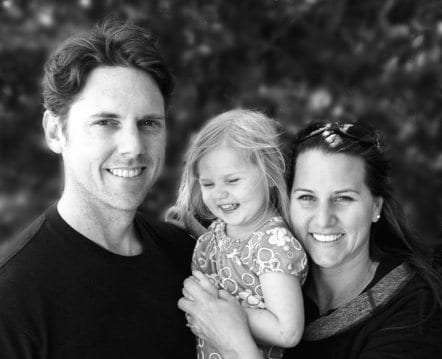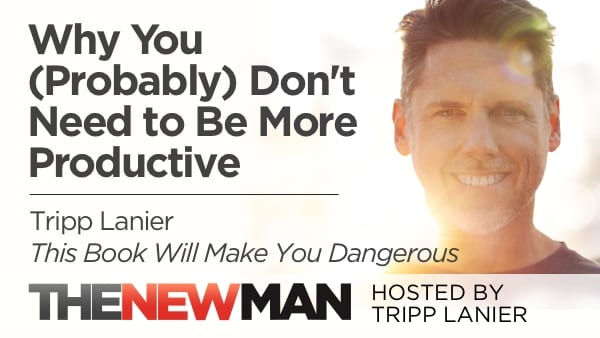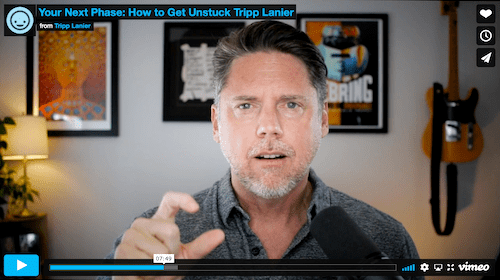Podcast: Download
Subscribe: RSS
Why You (Probably) Don’t Need to Be More Productive
 Are you busy but still feel like you’re not doing enough?
Are you busy but still feel like you’re not doing enough?
Does it seem like it’s all on you to keep things on track?
And do you think that being more productive would solve all of these problems?
Today we explore the possibility that our desire for greater productivity may be rooted in fear and delusion.
Here’s a transcript of this podcast:
You (Probably) Don’t Have a Productivity Problem
As a coach, I talk to a lot of guys who work hard and get a lot done. That said, it can seem like no matter what they do, it’s never really enough. Again and again, they find themselves feeling stuck or drained or overwhelmed by their situation. And again and again, many of them believe they feel the way they feel because they’re not productive enough.
Do a search, and you’ll see that there’s no shortage of productivity-related books and courses out there. Many of us are convinced that if we could just be more productive, then our experience of work would be more effective and enjoyable.
But I’m not convinced we have a productivity problem.
I believe we have a “proving” problem.
Here’s what I mean.
“No Matter What I Do, It’s Never Enough.”
Let’s imagine I’m coaching a C-level executive, and he has a laundry list of challenges he’s facing in his company.
On the outside he seems cool and calm, but on the inside he’s grinding.
“I’ve got to take care of these reports by Friday and then I have to prepare a presentation to the board the following week, but in the meantime my team just isn’t pulling their weight so it’s up to me to get this project across the finish line, like, yesterday. On top of that, it seems that one of the other teams are making moves behind my back, and…it’s just so much. I can’t see an end to this crap.”
When I ask him what he thinks will remedy this situation and put him back into a powerful, peaceful state of mind, he pauses.
“I guess I could wake up earlier? I guess I could stay a bit later, but I’m already missing out on time with my family.”
“I understand,” I say. “And tell me, who is asking you to shoulder all of this stuff? Are these your actual deliverables?”
He pauses again.
“I guess…well, not really. I mean, I set these deliverables. And, to be honest, if someone hints at wanting something, I just say ‘yes’ to it without even thinking” he says.
“Okay. So if you set these up, does that mean you could redefine what is to be delivered by whom and by when?” I ask.
He pauses again. He’s really chewing on something.
“I mean,” he says. “I guess I could, but…”
“But what?” I ask.
“I guess I could, but it just seems like I’m admitting defeat. It seems like I’m admitting that I’m a loser. Deep down I believe I should be able to handle this stuff,” he says.
“According to who? Your boss?” I ask.
“No. She’s fine. I mean, we don’t really talk about these things much. She always says I’m doing great,” he pauses.
“I think it’s me. I think I’m the problem,” he says. “I have a really hard time doing ‘just enough’ because that’s what slackers do. I feel like if I only do just enough to ‘hit the mark’ then I might be vulnerable to criticism or, you know, I make it easier to have someone else take my job.”
“So if you take it all on, if you over-deliver, if you constantly prove that you’re valuable then, what? You’ll be safe. Is that it?” I ask.
“Yeah. I never really thought about it that way, but yeah,” he says.
“And have you ever really sat down with the boss to talk about what’s truly expected? Do you have a grounded sense of your performance and position in the company or are you living in your own bubble of fear and constant self-criticism?” I ask.
“All of my assessments show that I’m going above and beyond, but it doesn’t really land for me. I’m in my own bubble. I’m constantly whipping myself and beating myself up over things that probably don’t even show up on her radar,” he says.
“Well, what if you weren’t in any real danger? What if, instead of wondering when the axe was going to fall, you could learn to challenge that voice of fear in your head? What if, instead of doing 30 extra hours of work every week in order to prove your value, you could learn how to say ’no’ without being a dick or putting your job at risk?” I ask.
Let’s pause here.
What are we taking away?
The Monster Under the Bed
Many times, when we are feeling driven into the ground by our work it’s because we’re piling it on ourselves. We’ve convinced ourselves that there’s a monster under the bed. But instead of grabbing a flashlight to take a look, we instead double down and strive to prove our value or worth in order to feel safe.
We believe it’s too ‘dangerous’ to push back. We fear saying ’no’ because we automatically assume that if we ruffle any feathers then we’ll be forced to live on the streets. Or worse — work for a cable news channel.
But there’s a tragic flaw to this strategy of proving our worth and value…
It’s not sustainable. That’s because instead of finding a strong pace, we adapt to the new level of expectations and simply pile on more. We rob ourselves of vitality and creative energy which makes us rigid, grumpy old men. We fill ourselves with toxic resentment which pushes others away. We withdraw into our bubble of delusion which kills trust.
In other words, in our effort to create more safety and certainty, we end up becoming our biggest liability.
So what can we do?
3 Steps from Proving to Productive
We can learn 3 basic steps to quit playing the victim and step into creative power…
(1) Challenge the monster under the bed. First we’ve got to challenge that voice of fear when it tries to convince us that we’re always in ‘danger’ or we’re always on the verge of disaster. “Is it really true that the sky will fall if I don’t prove to the world that I’m exceptional or deliver X by next week? Is it really true that I’m a loser or inadequate if I want more time or help?”
(2) Own what we want. Instead of playing the ‘yes man’, let’s slow down and ask ourselves, “Given that this is the situation, how do I want to respond? How do I want to address this challenge while also taking care of myself and being the father/husband/friend I want to be?”
(3) Have a skillful conversation. It’s one thing to act with integrity with ourselves, and it’s quite another to walk that talk with others. Most of the time this is where we fall short simply because we don’t want to have an uncomfortable conversation. But these conversations are simply a skill to develop. “I’d like to talk about the XYZ Project. Given the current situation, this is what we will bring in and when. What are your thoughts?”
Now here’s the deal. If you’re in a situation where (1) being honest with yourself (2) owning what you want in a way that aligns with your deeper values and (3) you can’t act accordingly within your organization — well, that’s good data. That tells us that you’ve got an opportunity to create greater alignment between your values and the work you do in the world.
(We’ll save that discussion for another time or coaching session.)
So the next time you catch yourself feeling trapped or drained or isolated or overwhelmed, I encourage you to slow down. I encourage you to work through these steps several times a day.
Here’s why…
What if There Was Nothing to Prove?
Most of the time, when we get over our need to prove anything to anyone we feel much lighter. When we engage these tiny, yet ‘dangerous’ conversations, the world says yes. I’ve seen this time and time again that when we clearly speak up for what we want — without lashing out or being a dick — we get what we want. And even if it doesn’t immediately produce rainbows and puppies, it’s far from the end of the world our primitive brains want us to believe.
This leaves us feeling energized and powerful — all without having to accomplish a mountain of tasks.
But don’t take my word for it. Try it yourself.
Start small. Pick a tiny little point of frustration and turn it into an opportunity to expand. Work through the steps above. Instead of believing the story that you’re inadequate or powerless, see if you can turn that friction into something that works in your favor.
Rinse and repeat. Day after day. This is the process that allows greater freedom, aliveness, love, and peace of mind.
Tripp
PS If you’d like to learn more about having ‘dangerous’ conversations and owning what you want without being a dick, check out This Book Will Make You Dangerous.
PPS And click here if you’d like to learn more about coaching with me.
Tripp Lanier is…
 Tripp Lanier is the author of This Book Will Make You Dangerous, and host of The New Man Podcast: Beyond the Macho Jerk and the New Age Wimp which — for over a decade — has been downloaded millions of times.
Tripp Lanier is the author of This Book Will Make You Dangerous, and host of The New Man Podcast: Beyond the Macho Jerk and the New Age Wimp which — for over a decade — has been downloaded millions of times.
As a Professional Coach…
Since 2005, he has spent thousands of hours coaching people all around the world to get out of the rat race, become an authority in their field, and make a great living doing the work they were put on this earth to do. Over the years he’s designed several businesses to support a simple lifestyle focused on freedom, ease, meaning, and fun.
As Host of The New Man Podcast…
Tripp Lanier has conducted hundreds of interviews with experts and authors from all walks of life including:
- Tim Ferriss (The 4 Hour Workweek, The 4 Hour Body, The 4 Hour Chef)
- Laird Hamilton (Big wave surfing legend)
- Ryan Holiday (The Obstacle is the Way, The Ego is the Enemy, The Daily Stoic)

- Phil Stutz and Barry Michels (The Tools, Coming Alive)
- Dan Millman (Way of the Peaceful Warrior)
- Steven Pressfield (The War of Art, Turning Pro)
- Robert Greene (48 Laws of Power, Mastery)
- Steven Kotler (The Rise of Superman, Stealing Fire)
- Mark Manson (The Subtle Art of Not Giving a F*ck)
- Aubrey Marcus (Founder/CEO of Onnit)
- Dr. Robert Glover (No More Mr Nice Guy)
- Navy SEAL Mark Divine (Unbeatable Mind, The Way of the SEAL)
- Jonathan Haidt (The Happiness Hypothesis, The Righteous Mind, The Coddling of the American Mind)
- Neil Strauss (The Game, The Truth)
- Alan Alda (legendary actor and NY Times best selling author)
As a Human Guinea Pig…
 Tripp has thrown himself into everything from 10 day silent meditation retreats to plant medicine journeys to men’s groups in the Costa Rican jungle to somatic sex intensives in his bedroom to drinks with Zen masters — He even learned some life lessons by hanging out backstage with David Lee Roth.
Tripp has thrown himself into everything from 10 day silent meditation retreats to plant medicine journeys to men’s groups in the Costa Rican jungle to somatic sex intensives in his bedroom to drinks with Zen masters — He even learned some life lessons by hanging out backstage with David Lee Roth.
At the age of 23, Tripp created one of the first digital video post-production companies in the Southeast. To support his music career and love for travel, he crafted TV shows and commercials for national and regional clients. Wanting to align his personal values with his work in the world, he sold the company after 12 years to become a professional coach. Other contributions include working with world-renowned philosopher Ken Wilber as Co-Director of Integral Institute’s Art Center.
Tripp is married to therapist/relationship coach Alyson Lanier and has the best daughter in the whole wide world. They live in a small beach town in North Carolina where he spends much of his time surfing, playing music, and enjoying a simple life.





